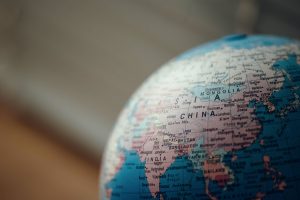Q&A With Dr. Michael Jones-Correa

“Globalization” has become such a frequently used buzzword that its meaning has lost impact. And, yet, it’s a concept that is central to all of our lives as the world is now more interlinked than ever.
To help us better understand the current state of globalization is Dr. Michael Jones-Correa, a Presidential Professor of Political Science at the University of Pennsylvania, where he is also director of the Center for the Study of Race, Ethnicity and Immigration. He’s spent the last 25 years teaching, studying and publishing research on topics from the political integration of new immigrants to intergroup relations and comparative urban politics. Dr. Jones-Correa guides us through not only globalization’s economic consequences but its significant cultural and social effects, too. What would a truly globalized world look like? And at the end of the day, does the world need more globalization or less?
This interview has been edited for length and clarity.
Q: Has globalization played more of a positive or negative role in the world?
Jones-Correa: We are in a second great wave of globalization. The first started roughly around 1880 and lasted until the first World War, and the second began after the second World War and has lasted until today. Both episodes of globalization entailed substantial movements of capital, goods and people, though the period today accounts for a larger proportion—as much as one-quarter—of the global economy. The movements of goods and people have generally been beneficial—they have lowered costs and created opportunities that millions, if not billions, of people would not have had otherwise. That is to say, the benefits of globalization have been very widespread, through the creation of jobs, the lowering of consumer prices, and the change for many to start a new life in other countries. However, while the benefits of globalization have been widely felt, they have also been disproportionately captured by a relative few—the owners of capital. As a result, both waves of globalization have also been characterized by increasing inequality and disparities of wealth.
Q: Technology has made globalization possible, but is it accelerating and amplifying inequality? And have world leaders and institutions done enough to prevent this?
Jones-Correa: Globalization as a phenomenon of the movement of people and capital exists apart from technological change but changes in communication, transportation and automation have all helped accelerate the processes involved. The use of technology by consumers has become much more widespread, at lower cost, than ever before. But at the same time, technological change also accelerates inequality, by allowing the further concentration of the benefits of globalization as automation results in fewer people benefiting from gains in trade. If there’s been a failure of leadership and institutions, it’s been that these have placed too great an emphasis on the overall gains from globalization for most people, without paying sufficient attention to the real costs of globalization for some, and the overall increases in inequities of both rewards and opportunities in the new global economy for everyone.
“While the benefits of globalization have been widely felt, they have also been disproportionately captured by a relative few.” — Dr. Michael Jones-Correa
Q: Who are the biggest winners and losers of a globalized economy?
Jones-Correa: The biggest winners from globalization are the owners of capital—the corporations that manage much of the production and trading of goods across borders, and those who invest in them. This is not just a tiny group—not just the .01 percent, or the 1 percent. It’s the producers of services, of ideas and content, who also benefit from the current form of globalization, and who disproportionately reap its rewards: people around the globe who are more highly educated and more mobile than ever before. Another side effect of globalization is mass tourism, with tens of millions more traveling for work and pleasure, putting pressure on places like Venice or Kyoto or Doha. The losers are those working in industries displaced by the new global efficiencies—meat producers in India being undersold by producers from Brazil, steel workers in the UK displaced by new mills in South Korea, and on and on. There’s a lot of talk of retraining and finding workers new positions in their local economies, but for most there really is no good alternative, and they are being permanently displaced.
Q: As the world has become more interconnected, how have countries reacted?
Jones-Correa: One political reaction to globalization has been a heightened xenophobic nationalism. Rather than address economic inequality, this nationalist backlash focuses on the migrants who are seen as a key symptom of undesirable cultural change—the perception that changes to one’s way of life are due to those who look different, or who speak a different language. We’ve seen this kind of backlash across many countries in Europe, North America, Africa and Asia. The political response to this sense of loss has been to close off borders, restrict immigration and asylum flows, and expel those who seem different. In some sense, these reactions have been largely symbolic—the larger movements of people across borders continues. But the backlash has often targeted the most vulnerable migrants and minorities, depriving them of rights and any access to a social safety net, while distracting from the very real issues raised by globalization.
Q: Is a borderless future possible and sustainable?
Jones-Correa: A truly globalized world would allow the free movement of capital, people and ideas. This vision collides with the fact of a political system designed around the nation-state, with nation-states exercising territorial control in order to both raise revenue and provide social welfare. It’s possible to imagine a world without nation-states, but it’s not easy to envision what kinds of institutions would replace or supplement nation-states’ role, and how these would be better at addressing concerns about inequality and access to opportunity. Conceivably, a world without nation-states might be one that allowed other kinds of non-state actors—corporations, for instance—to take on an even greater role, and for the wealthy to benefit even more disproportionately from globalization. Thinking through what a more just and equitable world would look like is a noble goal—but it’s not clear to me that it would necessarily be a world without states and borders.
“A truly globalized world would allow the free movement of capital, people and ideas.”
— Dr. Michael Jones-Correa
